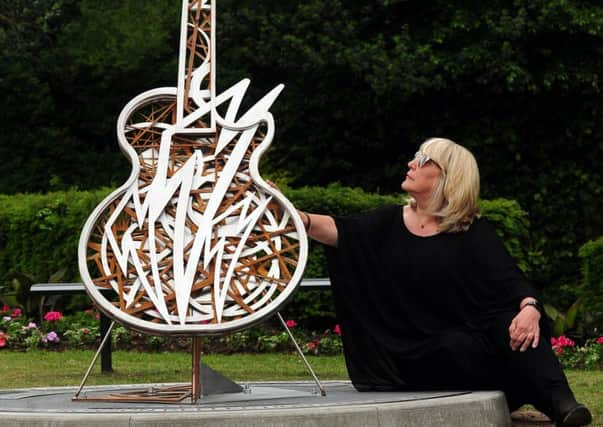Hull honours Bowie's guitarist Mick Ronson in the park he once dug


Maggi Ronson was still a schoolgirl, helping to load the delivery van her brother Mick drove through east Hull – when he wasn’t digging parks and football pitches for the council.
The memories of those times, as the 1960s gave way to the 70s, came flooding back yesterday as she returned his old flowerbeds in East Park to see the unveiling of an eight-foot steel sculpture created in his memory.
Advertisement
Hide AdAdvertisement
Hide AdThough Hull remembers Mick Ronson as one of its own, the world would know him as the guitarist and arranger behind David Bowie at the height of the glam rock chapter of his career.
Their appearance together in gold lamé on Top of the Pops in 1972, performing the song Starman, is one of the decade’s most indelible snapshots of popular culture.
It had taken Ronson just two years to get from Bilton Grange, a few hundred yards from where his memorial now stands, to the big time. Soon after that, he took his sister to live with him in London.
“He would always include me and take me to rehearsals and concerts,” she said.
Advertisement
Hide AdAdvertisement
Hide AdAs she examined the statue at yesterday’s unveiling in East Park’s Michael Ronson Garden of Reflection, she reflected: “It seems very strange – it’s a guitar and a garden, and people have asked whether it really captures Mick.
“But if you knew Michael, that was definitely the way he was – this humble, lovely man. He may have been ‘Mr Rock God’ on stage but he was a lad from Hull – very funny and with all the traits that you come across with Hull people.”
The statue was commissioned from designs by students at Hull College. Janis Skodins, an 18 year-old 3D design student, produced the winning submission.
He said: “I wanted to put some of his character and signature moves in the design and I found that he had things like strings overhanging on his guitar, which I included.
Advertisement
Hide AdAdvertisement
Hide Ad“I’m surprised my design was chosen to be made into an 8ft version but I’m really proud and excited to see the final piece.”
Ronson died in 1993 from cancer of the liver, at just 46. His sister, a nurse 11 years his junior, said she had seen the statue the previous day “to get the emotional part of me out of the way”.
It replaces a previous memorial, a brick performance area in Hull’s Queen’s Gardens, which Ms Ronson had also helped to commission. Positioned in front of a flat-roofed brick cafe, it had fallen out of favour and Ronson’s friend, the rock star Steve Harley, had led a fundraising campaign for the new artwork.
Ms Ronson said: “The sculpture is incredible, and I’m glad it’s been done by a Hull student. It’s a fitting place for it, with lovely flowers behind it.”
Advertisement
Hide AdAdvertisement
Hide AdHull’s former Lord Mayor, Coun Mary Glew, who unveiled it, said: “Mick Ronson left an enduring legacy to the world of contemporary music and this sculpture, along with the Garden of Reflection, is a fitting tribute to his memory.
“It has been nice to involve other local artistic talent in the form of Hull College students.
“I hope people enjoy visiting the garden and reflecting on Mick’s life and legacy.”
The sculpture is among 100 plaques and memorials to notable figures from Hull commissioned for its City of Culture celebrations.
Advertisement
Hide AdAdvertisement
Hide AdThe bass player Trevor Bolder, another member of David Bowie’s Spiders From Mars backing band, who died four years ago at 62, is also due to be honoured.
• Mick Ronson was best known for his association with Bowie but he also had a hand in other classics of the period.
He produced Mott the Hoople’s album, All the Young Dudes and co-produced Lou Reed’s Transformer, on which he played lead guitar and piano on the track, Perfect Day.
His solo albums included Slaughter on 10th Street and Heaven and Hull.
Advertisement
Hide AdAdvertisement
Hide AdHe had tried his luck in London before joining Bowie, but recalled in 1970: “It had been a real battle even just to live and eat, and in the end I had to get a job in a garage because I wasn’t earning enough from my music. So I came back to Hull and a job with the Parks Department.”